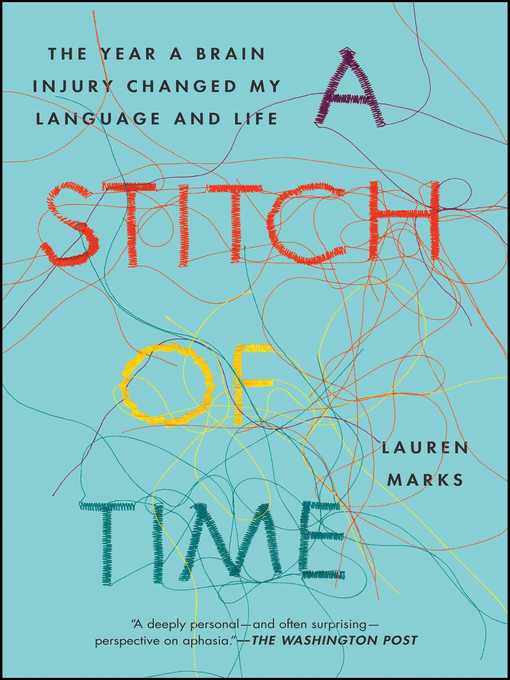
A Stitch of Time
The Year a Brain Injury Changed My Language and Life
سال آسیب مغزی زبان و زندگی من را تغییر داد
کتاب های مرتبط
- اطلاعات
- نقد و بررسی
- دیدگاه کاربران
نقد و بررسی

November 28, 2016
On a trip to Scotland in 2007, Marks, who was then 27, suffered a brain aneurysm that left her unable comprehend the written word and made it difficult for her to communicate verbally. In this engrossing memoir, she takes readers on a journey of the ever-fascinating mind and her own long road to recovery. Through her journal entries and notes, she describes what it’s like to come back from debilitating brain injury. She explores how we understand language and why it makes up so much of one’s sense of self. The story is broken into four parts, with markers for each month of her first year of recovery. Marks gives an inside account of a brain in the act of healing—including all the ups, downs, and complications—and also supplies useful information for those suffering from aphasia, including a detailed list of books and studies by others. Marks provides a story of hope. Agent: Bonnie Nadell, Hill Nadell Literary.

April 1, 2017
A young woman is forced to unpack her own mind after suffering a life-threatening brain aneurysm.For a book about a woman whose brain nearly killed her and left her personality inexorably changed, there's a counterintuitively strong sense of ego in this illuminating debut memoir by writer and activist Marks. On Aug. 23, 2007, the author, a theater actress and director, was singing karaoke in a bar in Edinburgh when she collapsed onstage. She awoke to a phenomenon she describes as "the Quiet," a changed sense of consciousness attributed to the massive aneurysm that might have killed her. Her most profound symptom was not distress but aphasia, a critically compromised ability to read, write, or speak. Much of the material is awkward yet strangely expressive--Marks shares copies of her first abortive attempts to write--but it's also revelatory about the process of recovery. "In my journals, a discovered word was a sacrament--a thing I could write," she remembers. "And if I could write the thing, I could read it. If I could read the thing, I could often say it. The process indicated that there was much more to explore, a rapturous language life that could be sought, and more importantly, found." The book's self-exploration of its patient's inner voice, frightening surgical interventions, and delicate recovery is captivating, but the ups and downs of her personal life are less so. It's uncomfortable to see Marks lash out at her father ("You cannot write about this. None of this. No more EMAILS. NO BOOK. NOT EVER.") and equally so to experience the protracted death of her relationship with a boyfriend. Still, while the book lacks the sweetness of Jessica Fechtor's Stir (2015) or the scientific detachment of Jill Bolte Taylor's My Stroke of Insight (2008), readers will be compelled by the journey of a writer whose voice, however changed, remains her own. A cerebral travelogue from a writer revealing how she got from there to here.
COPYRIGHT(2017) Kirkus Reviews, ALL RIGHTS RESERVED.

April 1, 2017
Like Susannah Cahalan's Brain on Fire (2012), Marks' memoir retraces a period during which she faced an unexpected health challenge that changed her very identity. A pathogen invaded her body and jump-started brain inflammation, paranoia, and seizures, making her walk and talk like a late-stage Alzheimer's patient. Marks also experienced a hemorrhagic stroke that damaged tissues and cells in her brain and impaired her abilities to speak and write. Drawing on the diary she started in the hospital and kept up in 2007 and 2008, Marks raises such significant questions as What kinds of thoughts are impossible without our full, natural language? This is an intimate chronicle of a surprisingly common condition, aphasia, the loss of language following brain injury. One in 250 people experience it, making it more common than Parkinson's or multiple sclerosis. They and their families will undoubtedly identify with many of the issues Marks addresses. Especially helpful is the concluding Afterthoughts and suggested reading, which provides an epilogue on Marks' condition and excellent resources.(Reprinted with permission of Booklist, copyright 2017, American Library Association.)

























دیدگاه کاربران